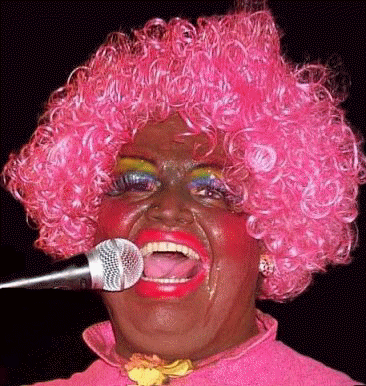 The pink-haired diva pictured here is the controversial Shirley Q. Liquor, a caricature of a poor black woman played by a gay white man raking in the dough with his racist shtick. Shirley Q. is a figure not so different from those of Amos 'n' Andy. And yet it is. Not only does Shirley's blackface still smile, but underneath her made-up skin, she is a man, a gay man.
The pink-haired diva pictured here is the controversial Shirley Q. Liquor, a caricature of a poor black woman played by a gay white man raking in the dough with his racist shtick. Shirley Q. is a figure not so different from those of Amos 'n' Andy. And yet it is. Not only does Shirley's blackface still smile, but underneath her made-up skin, she is a man, a gay man.Jasmyne Cannick writes on "Ban Shirley Q. Liquor" that the difference between a black man (such as Tyler Perry) donning the character of a black woman and a white man donning that mask is the difference between ignorance and racism. But is it? Newman's and Ely's articles both seem to point to empowerment even within a potentially limited, and stereotypically racist, sphere. The radio shows of the 1940s and 50s might have been limited in scope and have reinforced stereotypes, they made way for public power. Amos 'n' Andy, the TV show, offered roles to black actors and showed the world black characters, albeit minor characters, with positive characteristics.
I'm not a proponent of Shirley Q. Liquor or any other blackface (e.g. Tropic Thunder). And I'm sometimes even squeamish of movies like Madea, which Cannick considers less troubling than Shirley Q, because it's a black man mocking black women, instead of a white man mocking them. I do wonder, though, why it is popular among gay men (I first learned of Shirley through my gay friends). And I wonder whether Charles Knipp (Shirley's daytime ego) is allowed his racism because he's a gay man and is already disenfranchised. Does it become like a form of "in-language" that's tolerated because it's one minority to another? Or are there other social issues at play? Black Americans and gay Americans have certainly had their issues. They follow the path of many instances of minority against minority. Down-low culture is looked on with both criticism and a sort of exotic Otherness by white gays. Black christianity often embraces the homophobia of the most extreme corners of the religion.
Like the hostility between Irish immigrants and black citizens seen a hundred years ago (and perhaps still), there is usually only room for one minority at the top. To gain majority support, one minority joins with the majority in demoting the other minority. Pro-minority support is like energy: it cannot be created, only transfered. To some extent the progressive election results on November 4 was retrograde: black Americans win and gay Americans lose. As Kathy suggested in class on Thursday (and I would agree), this was likely no coincidence. And while the "Yes" votes on Prop 8 (the only really feasibly-fought of similar measures on 11/4) was not won solely by the black vote, it probably received more "yes"s than "no"s from that sector.
So what do we do with that? I'm guessing Shirley Q. is a way for some gay men to "win," if only by making black women "lose." Is there anything to be gained by black women? Within the awful stereotypes of working the welfare system, promiscuity, and ignorance and poor English, I certainly can't find it. So what makes Amos 'n' Andy different? Regardless of the groups, can there ever be a win when there's such a loss?
No comments:
Post a Comment